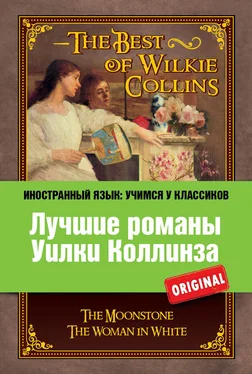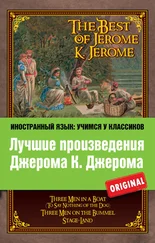The curtain rose, and the opera began.
Throughout the whole of the first act we remained in our position – the Count, absorbed by the orchestra and the stage, never casting so much as a chance glance at us. Not a note of Donizetti’s [267]delicious music was lost on him. There he sat, high above his neighbours, smiling, and nodding his great head enjoyingly from time to time. When the people near him applauded the close of an air (as an English audience in such circumstances always WILL applaud), without the least consideration for the orchestral movement which immediately followed it, he looked round at them with an expression of compassionate remonstrance, and held up one hand with a gesture of polite entreaty. At the more refined passages of the singing, at the more delicate phases of the music, which passed unapplauded by others, his fat hands, adorned with perfectly-fitting black kid gloves, softly patted each other, in token of the cultivated appreciation of a musical man. At such times, his oily murmur of approval, “Bravo! Bra-a-a-a!” hummed through the silence, like the purring of a great cat. His immediate neighbours on either side – hearty, ruddy-faced people from the country, basking amazedly in the sunshine of fashionable London – seeing and hearing him, began to follow his lead. Many a burst of applause from the pit that night started from the soft, comfortable patting of the black-gloved hands. The man’s voracious vanity devoured this implied tribute to his local and critical supremacy with an appearance of the highest relish. Smiles rippled continuously over his fat face. He looked about him, at the pauses in the music, serenely satisfied with himself and his fellow-creatures. “Yes! yes! these barbarous English people are learning something from ME. Here, there, and everywhere, I – Fosco – am an influence that is felt, a man who sits supreme!” If ever face spoke, his face spoke then, and that was its language.
The curtain fell on the first act, and the audience rose to look about them. This was the time I had waited for – the time to try if Pesca knew him.
He rose with the rest, and surveyed the occupants of the boxes grandly with his opera-glass. At first his back was towards us, but he turned round in time, to our side of the theatre, and looked at the boxes above us, using his glass for a few minutes – then removing it, but still continuing to look up. This was the moment I chose, when his full face was in view, for directing Pesca’s attention to him.
“Do you know that man?” I asked.
“Which man, my friend?”
“The tall, fat man, standing there, with his face towards us.”
Pesca raised himself on tiptoe, and looked at the Count.
“No,” said the Professor. “The big fat man is a stranger to me. Is he famous? Why do you point him out?”
“Because I have particular reasons for wishing to know something of him. He is a countryman of yours – his name is Count Fosco. Do you know that name?”
“Not I, Walter. Neither the name nor the man is known to me.”
“Are you quite sure you don’t recognise him? Look again – look carefully. I will tell you why I am so anxious about it when we leave the theatre. Stop! let me help you up here, where you can see him better.”
I helped the little man to perch himself on the edge of the raised dais upon which the pit-seats were all placed. His small stature was no hindrance to him – here he could see over the heads of the ladies who were seated near the outermost part of the bench.
A slim, light-haired man standing by us, whom I had not noticed before – a man with a scar on his left cheek – looked attentively at Pesca as I helped him up, and then looked still more attentively, following the direction of Pesca’s eyes, at the Count. Our conversation might have reached his ears, and might, as it struck me, have roused his curiosity.
Meanwhile, Pesca fixed his eyes earnestly on the broad, full, smiling face turned a little upward, exactly opposite to him.
“No,” he said, “I have never set my two eyes on that big fat man before in all my life.”
As he spoke the Count looked downwards towards the boxes behind us on the pit tier.
The eyes of the two Italians met.
The instant before I had been perfectly satisfied, from his own reiterated assertion, that Pesca did not know the Count. The instant afterwards I was equally certain that the Count knew Pesca!
Knew him, and – more surprising still – FEARED him as well! There was no mistaking the change that passed over the villain’s face. The leaden hue that altered his yellow complexion in a moment, the sudden rigidity of all his features, the furtive scrutiny of his cold grey eyes, the motionless stillness of him from head to foot told their own tale. A mortal dread had mastered him body and soul – and his own recognition of Pesca was the cause of it!
The slim man with the scar on his cheek was still close by us. He had apparently drawn his inference from the effect produced on the Count by the sight of Pesca as I had drawn mine. He was a mild, gentlemanlike man, looking like a foreigner, and his interest in our proceedings was not expressed in anything approaching to an offensive manner.
For my own part I was so startled by the change in the Count’s face, so astounded at the entirely unexpected turn which events had taken, that I knew neither what to say or do next. Pesca roused me by stepping back to his former place at my side and speaking first.
“How the fat man stares!” he exclaimed. “Is it at ME? Am I famous? How can he know me when I don’t know him?”
I kept my eye still on the Count. I saw him move for the first time when Pesca moved, so as not to lose sight of the little man in the lower position in which he now stood. I was curious to see what would happen if Pesca’s attention under these circumstances was withdrawn from him, and I accordingly asked the Professor if he recognised any of his pupils that evening among the ladies in the boxes. Pesca immediately raised the large opera-glass to his eyes, and moved it slowly all round the upper part of the theatre, searching for his pupils with the most conscientious scrutiny.
The moment he showed himself to be thus engaged the Count turned round, slipped past the persons who occupied seats on the farther side of him from where we stood, and disappeared in the middle passage down the centre of the pit. I caught Pesca by the arm, and to his inexpressible astonishment, hurried him round with me to the back of the pit to intercept the Count before he could get to the door. Somewhat to my surprise, the slim man hastened out before us, avoiding a stoppage caused by some people on our side of the pit leaving their places, by which Pesca and myself were delayed. When we reached the lobby the Count had disappeared, and the foreigner with the scar was gone too.
“Come home,” I said; “come home, Pesca to your lodgings. I must speak to you in private – I must speak directly.”
“My-soul-bless-my-soul!” cried the Professor, in a state of the extremest bewilderment. “What on earth is the matter?”
I walked on rapidly without answering. The circumstances under which the Count had left the theatre suggested to me that his extraordinary anxiety to escape Pesca might carry him to further extremities still. He might escape me, too, by leaving London. I doubted the future if I allowed him so much as a day’s freedom to act as he pleased. And I doubted that foreign stranger, who had got the start of us, and whom I suspected of intentionally following him out.
With this double distrust in my mind, I was not long in making Pesca understand what I wanted. As soon as we two were alone in his room, I increased his confusion and amazement a hundredfold by telling him what my purpose was as plainly and unreservedly as I have acknowledged it here.
Читать дальше
Конец ознакомительного отрывка
Купить книгу












